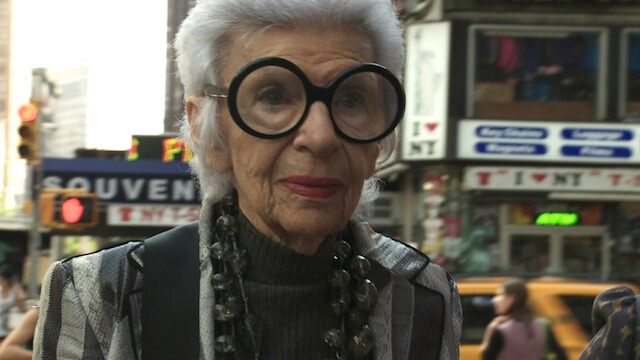‘Iris’ Albert Maysles was a pioneer of the direct cinema/cinema verite/fly-on-the-wall style of documentary filmmaking, but he and his brother David were also often drawn to a less spontaneous attraction: fashion and design. “Grey Gardens” inspired a rash of Little Edie imitators, who swiped her yen for head wraps and capes as skirts; their films on Christo and Jeanne-Claude dwelled on eye-grabbing art and its intrusion on the everyday. Iris Apfel, the nonagenarian fashion icon and runway gadfly, embodies the intersection of fashion, design and art. In the opening scene of “Iris,” Albert Maysles’ final solo film, its subject shows off an outfit that’s a hodgepodge of various sources, which she’s mixed and matched like a DJ. “I like originality,” she says, though originality in her case comes from combining, say, designer duds with scarves from an African boutique in Harlem. “Everything’s homogenized.” “Iris” hangs with her, but not in the manner of the big classic Maysles docs, like “Salesman,” “Gimme Shelter” or even “Grey Gardens.” Those films were witnesses to history in the making — or in the latter case, to the secret rituals of a cloistered couple. Apfel is complicit in “Iris”’ making, talking to the camera and guiding it on little trips or simply roaming about the exquisitely cluttered New York apartment she shares with her even-older husband, Carl. It includes cutaways to pictures and such during dips into her past, like any traditional doc profile. It’s life captured as well as constructed. “Iris” mostly stays in the present, though, and there’s a great intimacy in the way Maysles made it, in part because Apfel is a relentlessly charismatic subject. She and Maysles have a clear rapport; it’s one legend meeting another. They’re both senior citizens who never slowed down, preferred to be on the move, indulging in their rabid, insatiable curiosity (that and a sense of humor, she says, is all one needs in life) and the need to always change who they are. For Maysles, who passed in March at 89, his art was others; for Apfel it’s her body, on which she drapes an ever-changing array of clothes and jewelry. Only the super-sized owl glasses stay the same. She admits to never being pretty (“I don’t like pretty”), and how that only pushed her to become interesting in more productive ways. Clothes makes the woman. The other main idea floating through “Iris,” stated non-insistently, is the ever-shifting definition of art. Historically the question has been a tedious one, i.e.,“Is it art just because someone puts it on the wall?” Nowadays what constitutes artistic expression is simply becoming more broad, encompassing those, like Apfel, who are both the middleman between art and consumer and someone who makes art from other art. She’s a scrounger, a gleaner, and she knows how to pair disparate pieces into an eye-catching mash-up. When her wares wind up in the Met it’s a no-brainer, although putting her work on display doesn’t render them untouchable. No gallery can be better than Apfel herself.
Director: Albert Maysles
Genre: Documentary
Rating: NR
3 (out of 5) Globes
Review: ‘Iris’ is Albert Maysles’ intimate swan song

Magnolia Pictures
Follow Matt Prigge on Twitter @mattprigge


















